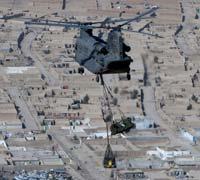Pakistan’s spy agency is “playing with the devil”

Pakistan’s ISI intelligence agency provides funding, training and sanctuary to the Taliban in Afghanistan on a scale far greater than previously believed, a new study claimed.
The Pakistani military swiftly dismissed the report from the London School of Economics (LSE) as “malicious and baseless”.
The LSE study, based on interviews with nine Taliban field commanders in Afghanistan between February and May this year, claims the relationship between the ISI and the militants goes far beyond current estimates.
“Although the Taliban has a strong endogenous impetus, according to Taliban commanders the ISI orchestrates, sustains and strongly influences the movement,” wrote author Matt Waldman, a fellow at Harvard University.
“They say it gives sanctuary to both Taliban and Haqqani groups, and provides huge support in terms of training, funding, munitions, and supplies. In their words, this is ‘as clear as the sun in the sky’.”
The LSE report comes in the wake of concerns raised in Ottawa about the tens of millions of dollars being pumped into Pakistan in foreign aid as Canada’s largest military deployment since the Korean War, fights on its doorstep.
“There is no doubt that the Pakistani ISI works closely with the Taliban which has been killing Canadians and other NATO soldiers,’ said a government source in Ottawa, who requested anonymity.
“Washington has already begun issuing stern warnings and we need to start letting Pakistan know that we are serious about going after everyone involved in terror – Pakistani or otherwise,” he said.
A former Indian diplomat told the Asian Pacific Post that Pakistan uses the ISI to entrench its strategic interest in Afghanistan especially now as preparations for NATO withdrawals take centre stage.
“There will be vacuum and Pakistan does not want its main rival India to gain a foothold there…Pakistan maybe on our side in the war on terror on paper… but it is playing with the devil at the same time,” he said.
The ISI helped to create the Taliban in the early 1990s, principally to prevent its arch-rival, India, from gaining a strategic foothold in Afghanistan after the withdrawal of Soviet troops.
It claims to have severed all links with the Islamist movement but remains determined to prevent a pro-Indian government from taking power in Kabul after NATO troops leave.
Last year, top US military officer Admiral Mike Mullen said there were “indications” that elements of Pakistan’s intelligence service lend support to Al-Qaeda and Taliban militants -- sparking furious denials in Pakistan.
Pakistan’s ISI has also been fingered for helping fund, arm and train other militant groups that take on the Indian state.
Last month, The Garo National Liberation Army (GNLA), a militant outfit in Meghalaya, said that Pakistan’s main intelligence agency and jehadi groups offered it help to take on India.
“The ISI (Inter-Services Intelligence) and several jehadi groups extended help to the GNLA but I refused,” GNLA chairman Champion R. Sangma told IANS over the telephone from an undisclosed location.
Sangma, a former deputy superintendent of police, deserted the Meghalaya Police and floated the GNLA in 2007.
“There are many examples like this,” said the former Indian diplomat, commenting on this incident.
Peter Jones, Associate Professor in the Graduate School of Public and International Affairs at the University of Ottawa said Canada and Pakistan have developed a multi-faceted and mature relationship that has expanded considerably in recent years through Canada’s involvement in the war in Afghanistan.
“As a member of the NATO coalition fighting in Afghanistan, Canada now has a direct interest in day-to-day events in Pakistan,” he wrote in the Asia-Pacific Agenda, a publication of the Asia Pacific Foundation of Canada.
“The coalition fighting in Afghanistan has pressed Pakistan to “do more” to confront the Taliban and other extremists using its territory. This has contributed to sometimes tense exchanges between Islamabad and the coalition members, including Canada,” wrote Peter Jones.
Canada, he states will also continue to regard Pakistan’s nuclear program with concern, especially as it has proven to be one of the more proliferation-prone of such programs. Canada plans to maintain its weapons embargo to Pakistan, put in place following mid-1990s nuclear testing.
“One is left to wonder what the level of Canada’s interest in Pakistan will be once Canada’s troops leave Afghanistan,” he concluded.
For instance, in January 2007, former Foreign Affairs Minister Peter MacKay visited Pakistan, where he intended to have “blunt talk” with President Musharraf over the Afghanistan-Pakistan border. This face-to-face meeting never transpired as Minister MacKay was only able to meet with his Pakistani counterpart.
As part of Canada’s aid allocation to the region, it has committed $32 million until 2011 to support Pakistan-Afghanistan border management and training.
Canada- Pakistan at a glance
• Canada established relations with Pakistan upon the founding of that state in 1947.
• Canada provided nuclear technology for development purposes that has been implicated in Pakistan’s subsequent development of a nuclear weapon.
• According to Statistics Canada, total bilateral trade last year was around $650 million, with Canada enjoying a $158 million surplus. Canadian exports to Pakistan were largely agricultural while Pakistan’s exports to Canada were almost 75% textiles.
• Canadian direct investment in Pakistan was $32 million in 2009.
• There are about 300,000 to 350,000 people of Pakistani origin in Canada.
• Pakistan is between the 10th and 16th largest source of foreign students in Canada.
• Pakistan has been a major recipient of Canadian aid for more than forty years.
• In 2009, the Canadian International Development Agency (CIDA) placed Pakistan on its list of twenty “countries of focus.” In 2007-2009, CIDA reports that total aid was $64.5 million, with $44.6 million being bilateral aid and $19.9 million aid funneled through multilateral organizations.
• The Canadian government-funded International Development Research Centre (IDRC) has also been active in Pakistan since 1977. Since that time, the IDRC has supported 57 projects in or involving Pakistan, for a total allocation of $19.9 million.
– Asia Pacific Agenda









